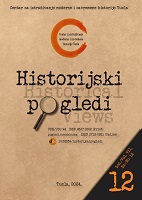RELATIONS BETWEEN KOSOVO AND ALBANIA (1968-1969)
RELATIONS BETWEEN KOSOVO AND ALBANIA (1968-1969)
Author(s): Kosovar BASHASubject(s): Political history, Government/Political systems, International relations/trade, Post-War period (1950 - 1989)
Published by: Centar za istraživanje moderne i savremene historije Tuzla
Keywords: Kosovo; Albania; Yugoslavia; Relations;
Summary/Abstract: This study sheds light on the relations between Kosovo and Albania during 1968. Using archival documents in the Ministry of Foreign Affairs of Albania, relevant literature and the press of the time, the author intended to carefully treat these relations in several aspects such as military, political, educational, and cultural. The developments between the two countries, including important academic organizations, the role of intellectuals in Kosovo, the demands of students for the Republic of Kosovo within the Yugoslavia and Albania in the meantime, are seen by the author as inseparable parts of a historical context. Albanian historiography has valuable studies in the light of these complex relationships for the period 1968-1969. The author highlights the political and economic aspects as the main characteristic of this cooperation that prevailed in these relationships between the two countries. Until 1966, the main source of the Albanian leadership regarding the events in Yugoslavia and Kosovo and Metohija was the Embassy of Albania in Belgrade, as well as embassies in other European countries, which received certain information about Yugoslavia. After the Brion Plenum, Albania began to receive confidential information from unnamed sources from the provincial leadership of Kosovo and Metohija. As the origin of certain information in the reports, the Nase minister often stated “from our source close to Fadil Hoxha or “from our source in U dba” or “from our source in the Kosovo leadership”. I have no doubt that during this period, Albania developed a network of informers in the province, including which included influential provincial officials The confidential documents of the Central Committee of the Party of Labor of Albania also contain some so fa r little-known information about events in the province and political relations in Yugoslavia at the end of the 1960s. Their content in certain measures raises the question of how much the understanding of socialist Yugoslavia in the decades after its disintegration was determined by the untouchability of the postulate of the pro-Yugoslav orientation of the leaders who created the state and party policy of the Union of Communists of Yugoslavia in the 1960s. Changes in the position of the autonomous provinces in Serbia at the end of the sixties of the 20th century were reflected in the relations of Kosovo with Albania. State Secretariat for Foreign Affairs and the Federal Executive Council began in 1967 to encourage the cultural and economic integration of Kosovo with Albania, explaining it as a strategy for the normalization of relations between Yugoslavia and Albania. After the meetings in Pristina and Tirana and the meetings between them visit of educational delegations, it was agreed that textbooks from Albania will be used in the school system of Kosovo and Kosovar companies redirected their production to the Albanian market. University of Tirana professors engaged are in classes at Pristina faculties. The reports of the Albanian lecturers from Prishtina did not provide the party leadership of Albania with a wide range of information about the situation in Yugoslavia. The work is primarily based on unpublished archival materials of the Central State Archives of Albania in Tirana and Archive of Kosovo.
Journal: HISTORIJSKI POGLEDI
- Issue Year: VII/2024
- Issue No: 12
- Page Range: 349-373
- Page Count: 25
- Language: English

